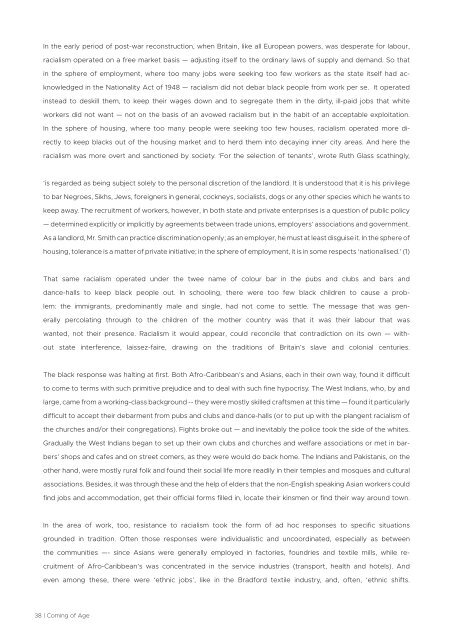Coming of Age : 1976 and the Road to Anti-Racism
Coming of Age : 1976 and the Road to Anti-Racism by Jagdish Patel and Suresh Grover
Coming of Age : 1976 and the Road to Anti-Racism
by Jagdish Patel and Suresh Grover
You also want an ePaper? Increase the reach of your titles
YUMPU automatically turns print PDFs into web optimized ePapers that Google loves.
In <strong>the</strong> early period <strong>of</strong> post-war reconstruction, when Britain, like all European powers, was desperate for labour,<br />
racialism operated on a free market basis — adjusting itself <strong>to</strong> <strong>the</strong> ordinary laws <strong>of</strong> supply <strong>and</strong> dem<strong>and</strong>. So that<br />
in <strong>the</strong> sphere <strong>of</strong> employment, where <strong>to</strong>o many jobs were seeking <strong>to</strong>o few workers as <strong>the</strong> state itself had acknowledged<br />
in <strong>the</strong> Nationality Act <strong>of</strong> 1948 — racialism did not debar black people from work per se. It operated<br />
instead <strong>to</strong> deskill <strong>the</strong>m, <strong>to</strong> keep <strong>the</strong>ir wages down <strong>and</strong> <strong>to</strong> segregate <strong>the</strong>m in <strong>the</strong> dirty, ill-paid jobs that white<br />
workers did not want — not on <strong>the</strong> basis <strong>of</strong> an avowed racialism but in <strong>the</strong> habit <strong>of</strong> an acceptable exploitation.<br />
In <strong>the</strong> sphere <strong>of</strong> housing, where <strong>to</strong>o many people were seeking <strong>to</strong>o few houses, racialism operated more directly<br />
<strong>to</strong> keep blacks out <strong>of</strong> <strong>the</strong> housing market <strong>and</strong> <strong>to</strong> herd <strong>the</strong>m in<strong>to</strong> decaying inner city areas. And here <strong>the</strong><br />
racialism was more overt <strong>and</strong> sanctioned by society. ‘For <strong>the</strong> selection <strong>of</strong> tenants’, wrote Ruth Glass scathingly,<br />
‘is regarded as being subject solely <strong>to</strong> <strong>the</strong> personal discretion <strong>of</strong> <strong>the</strong> l<strong>and</strong>lord. It is unders<strong>to</strong>od that it is his privilege<br />
<strong>to</strong> bar Negroes, Sikhs, Jews, foreigners in general, cockneys, socialists, dogs or any o<strong>the</strong>r species which he wants <strong>to</strong><br />
keep away. The recruitment <strong>of</strong> workers, however, in both state <strong>and</strong> private enterprises is a question <strong>of</strong> public policy<br />
— determined explicitly or implicitly by agreements between trade unions, employers’ associations <strong>and</strong> government.<br />
As a l<strong>and</strong>lord, Mr. Smith can practice discrimination openly; as an employer, he must at least disguise it. In <strong>the</strong> sphere <strong>of</strong><br />
housing, <strong>to</strong>lerance is a matter <strong>of</strong> private initiative; in <strong>the</strong> sphere <strong>of</strong> employment, it is in some respects ‘nationalised.’ (1)<br />
That same racialism operated under <strong>the</strong> twee name <strong>of</strong> colour bar in <strong>the</strong> pubs <strong>and</strong> clubs <strong>and</strong> bars <strong>and</strong><br />
dance-halls <strong>to</strong> keep black people out. In schooling, <strong>the</strong>re were <strong>to</strong>o few black children <strong>to</strong> cause a problem:<br />
<strong>the</strong> immigrants, predominantly male <strong>and</strong> single, had not come <strong>to</strong> settle. The message that was generally<br />
percolating through <strong>to</strong> <strong>the</strong> children <strong>of</strong> <strong>the</strong> mo<strong>the</strong>r country was that it was <strong>the</strong>ir labour that was<br />
wanted, not <strong>the</strong>ir presence. Racialism it would appear, could reconcile that contradiction on its own — without<br />
state interference, laissez-faire, drawing on <strong>the</strong> traditions <strong>of</strong> Britain’s slave <strong>and</strong> colonial centuries.<br />
The black response was halting at first. Both Afro-Caribbean’s <strong>and</strong> Asians, each in <strong>the</strong>ir own way, found it difficult<br />
<strong>to</strong> come <strong>to</strong> terms with such primitive prejudice <strong>and</strong> <strong>to</strong> deal with such fine hypocrisy. The West Indians, who, by <strong>and</strong><br />
large, came from a working-class background -- <strong>the</strong>y were mostly skilled craftsmen at this time — found it particularly<br />
difficult <strong>to</strong> accept <strong>the</strong>ir debarment from pubs <strong>and</strong> clubs <strong>and</strong> dance-halls (or <strong>to</strong> put up with <strong>the</strong> plangent racialism <strong>of</strong><br />
<strong>the</strong> churches <strong>and</strong>/or <strong>the</strong>ir congregations). Fights broke out — <strong>and</strong> inevitably <strong>the</strong> police <strong>to</strong>ok <strong>the</strong> side <strong>of</strong> <strong>the</strong> whites.<br />
Gradually <strong>the</strong> West Indians began <strong>to</strong> set up <strong>the</strong>ir own clubs <strong>and</strong> churches <strong>and</strong> welfare associations or met in barbers’<br />
shops <strong>and</strong> cafes <strong>and</strong> on street comers, as <strong>the</strong>y were would do back home. The Indians <strong>and</strong> Pakistanis, on <strong>the</strong><br />
o<strong>the</strong>r h<strong>and</strong>, were mostly rural folk <strong>and</strong> found <strong>the</strong>ir social life more readily in <strong>the</strong>ir temples <strong>and</strong> mosques <strong>and</strong> cultural<br />
associations. Besides, it was through <strong>the</strong>se <strong>and</strong> <strong>the</strong> help <strong>of</strong> elders that <strong>the</strong> non-English speaking Asian workers could<br />
find jobs <strong>and</strong> accommodation, get <strong>the</strong>ir <strong>of</strong>ficial forms filled in, locate <strong>the</strong>ir kinsmen or find <strong>the</strong>ir way around <strong>to</strong>wn.<br />
In <strong>the</strong> area <strong>of</strong> work, <strong>to</strong>o, resistance <strong>to</strong> racialism <strong>to</strong>ok <strong>the</strong> form <strong>of</strong> ad hoc responses <strong>to</strong> specific situations<br />
grounded in tradition. Often those responses were individualistic <strong>and</strong> uncoordinated, especially as between<br />
<strong>the</strong> communities —- since Asians were generally employed in fac<strong>to</strong>ries, foundries <strong>and</strong> textile mills, while recruitment<br />
<strong>of</strong> Afro-Caribbean’s was concentrated in <strong>the</strong> service industries (transport, health <strong>and</strong> hotels). And<br />
even among <strong>the</strong>se, <strong>the</strong>re were ‘ethnic jobs’, like in <strong>the</strong> Bradford textile industry, <strong>and</strong>, <strong>of</strong>ten, ‘ethnic shifts.<br />
38 | <strong>Coming</strong> <strong>of</strong> <strong>Age</strong><br />
<strong>Coming</strong> <strong>of</strong> <strong>Age</strong> Final version 16.10.indd 38 17/10/2017 12:07







